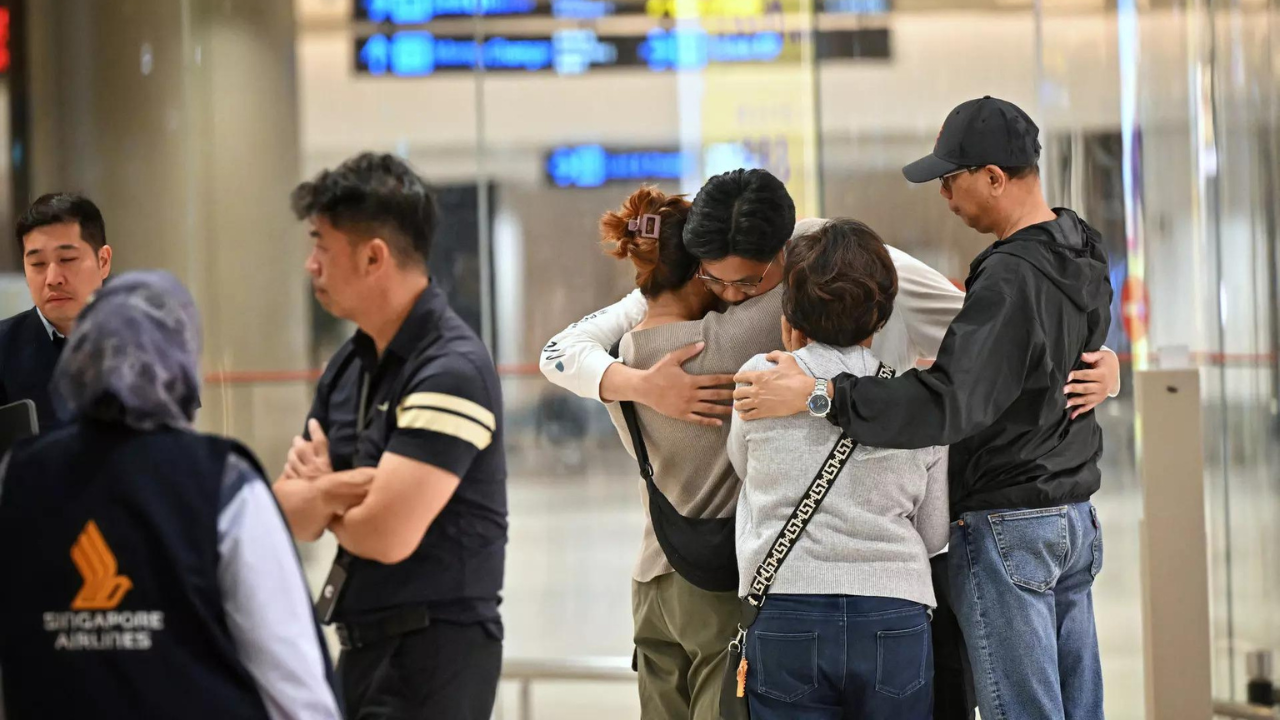World
‘Indigestion in mind’ : Passengers of turbulence-hit SIA flight inflicted psychological scars, experts say – Times of India

NEW DELHI: The psychological impact of the Singapore Airlines flight which underwent severe turbulence leaving 1 dead has left many survivors grappling with the aftermath, with some expressing hesitation about flying again in the near future. One passenger recounted waking up on the plane floor amidst the sounds of crying and the sight of blood, leading to feelings of nausea and distress.
SA flight SQ321 flight from London to Singapore encountered severe turbulence, causing a rapid ascent and descent of 400 feet within a minute, resulting in the death of one passenger and injuries to at least 30 others.
Mental health experts have highlighted the potential for passengers to develop various psychological conditions following such a traumatic experience.
These may include acute stress disorder (ASD), post-traumatic stress disorder (PTSD), and anxiety disorders. Dr. Amanda Oh, founder of Budding Space, likened the overwhelming nature of the event to “an indigestion in the mind,” emphasizing the difficulty in processing such a unique and distressing situation. Symptoms of ASD may manifest within a month of the incident, while PTSD can persist beyond that timeframe, affecting an individual’s social functioning and physical well-being.
“For such a unique experience as what the passengers had to go through, it would be an extremely overwhelming experience for anybody,” Dr Oh said.
“For example, if (the traumatised individuals) want to cry or talk about it, let them do that. Let them choose their way to grieve and process the experience in a way that they are comfortable with rather than hurrying them along that journey,” she added.
To aid in the recovery process, mental health professionals recommend maintaining a healthy lifestyle and engaging in activities that promote bilateral stimulation, such as walking and swimming. Family members can provide support by allowing the affected individuals to express their emotions and grieve in their own way, fostering a sense of autonomy and control. Dr. Thomas Lee, medical director at Resilienz clinic, suggests eye movement desensitization and reprocessing (EMDR) therapy as a potential treatment to reduce the impact of the traumatic memory.
While the road to recovery may be challenging, mental health experts remain hopeful that with adequate support and intervention, those affected by the turbulence on SQ321 can eventually overcome the psychological scars left by this harrowing experience.
(With inputs from agencies)
SA flight SQ321 flight from London to Singapore encountered severe turbulence, causing a rapid ascent and descent of 400 feet within a minute, resulting in the death of one passenger and injuries to at least 30 others.
Mental health experts have highlighted the potential for passengers to develop various psychological conditions following such a traumatic experience.
These may include acute stress disorder (ASD), post-traumatic stress disorder (PTSD), and anxiety disorders. Dr. Amanda Oh, founder of Budding Space, likened the overwhelming nature of the event to “an indigestion in the mind,” emphasizing the difficulty in processing such a unique and distressing situation. Symptoms of ASD may manifest within a month of the incident, while PTSD can persist beyond that timeframe, affecting an individual’s social functioning and physical well-being.
“For such a unique experience as what the passengers had to go through, it would be an extremely overwhelming experience for anybody,” Dr Oh said.
“For example, if (the traumatised individuals) want to cry or talk about it, let them do that. Let them choose their way to grieve and process the experience in a way that they are comfortable with rather than hurrying them along that journey,” she added.
To aid in the recovery process, mental health professionals recommend maintaining a healthy lifestyle and engaging in activities that promote bilateral stimulation, such as walking and swimming. Family members can provide support by allowing the affected individuals to express their emotions and grieve in their own way, fostering a sense of autonomy and control. Dr. Thomas Lee, medical director at Resilienz clinic, suggests eye movement desensitization and reprocessing (EMDR) therapy as a potential treatment to reduce the impact of the traumatic memory.
While the road to recovery may be challenging, mental health experts remain hopeful that with adequate support and intervention, those affected by the turbulence on SQ321 can eventually overcome the psychological scars left by this harrowing experience.
(With inputs from agencies)
Continue Reading







:max_bytes(150000):strip_icc()/roundup-writereditor-loved-deals-tout-f5de51f85de145b2b1eb99cdb7b6cb84.jpg)


